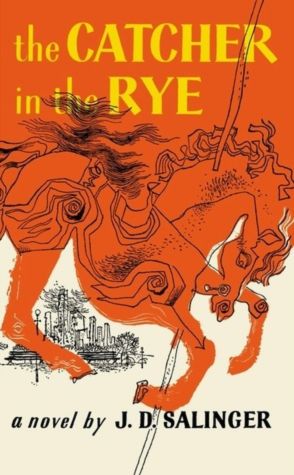
Holden’s Voice, Loud and Clear
The Catcher in the Rye by J.D. Salinger captures teenage angst and alienation like few novels ever have. Narrated by Holden Caulfield—one of literature’s most iconic voices—the story is a raw and unfiltered look at growing up in a world full of “phonies.” His cynical, biting commentary on society resonates across generations.
Holden’s unique voice, filled with contradictions and vulnerability, has made the book a mainstay in high school curricula. It speaks to the pain of growing up, the search for identity, and the struggle to find authenticity in a world obsessed with appearances.
The First Time I Met Holden
Before I started private boarding school in high school, my dad handed me a library copy of The Catcher in the Rye. That alone piqued my interest—he rarely checked out books.
I didn’t like the cover. I didn’t even understand the title. But I read it anyway because my dad had recommended it. As someone who had once been an avid reader himself, he gave me many of the books that shaped his childhood—Tom Sawyer, a Lou Gehrig biography, and a leatherbound Hardy Boys collection. I can still picture the covers. In our house, reading wasn’t optional. It was foundational.
Required Reading—And Then Some
In junior high, I was already reading intellectually rich material: To Kill a Mockingbird, The Most Dangerous Game, and classic Edgar Allan Poe. I enjoyed all of them. But The Catcher in the Rye felt different. It stuck with me.
Looking back, I believe it’s required reading at many boarding schools for a reason—especially for adolescent boys. It’s not just a book. It’s a mirror.
Phoniness Then and Now
Holden didn’t just criticize people. He dissected the world around him. From actors like Gary Cooper to present-day stars like George Clooney or Brad Pitt, his commentary on celebrity culture still holds up. J.D. Salinger clearly understood the teenage mind—its skepticism, its desire for truth, and its instinct to rebel against the surface-level shine of modern life.
Why It Still Matters
The book’s themes of alienation, identity, and emotional honesty remain as relevant today as they were in the 1950s. The Catcher in the Rye is not just a novel—it’s a rite of passage. It invites readers to look inward and ask the hard questions about what matters, what’s fake, and where they fit in the world.
As long as there are teenagers navigating the messiness of growing up, Holden Caulfield will continue to speak for them—and challenge them to think deeply.
Interested in the book?
The Catcher in the Rye by J. D. Salinger